|
|
|
Sort Order |
|
|
|
Items / Page
|
|
|
|
|
|
|
| Srl | Item |
| 1 |
ID:
133689
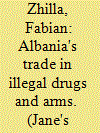

|
|
|
|
|
| Publication |
2014.
|
| Summary/Abstract |
With a new movement attempting to get to grips with organized crime in Albania. Fabian Zhilla examines trends in drug trafficking into Europe and the growth in contract killings arising from a developing market in arms and explosives.
|
|
|
|
|
|
|
|
|
|
|
|
|
|
|
|
| 2 |
ID:
191286
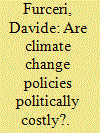

|
|
|
|
|
| Summary/Abstract |
Are policies designed to avert climate change (Climate Change Policies, or CCPs) politically costly? Using data on governmental popular support and the OECD's Environmental Stringency Index covering 30 countries between 2001 and 2015, our results show that CCPs are not necessarily politically costly: policy design matters. First, in contrast to non-market-based CCPs (such as emission limits), only market-based CCPs (such as emission taxes) entail political costs for the government. Second, the effects are only present when CCPs are adopted during periods of high oil prices, prior to elections, or in countries depending strongly on non-green (dirty) energy sources. Third, CCPs are only politically costly when inequality is high and/or social insurance/transfer does not sufficiently address the regressivity of CCPs. Our results are robust to numerous robustness checks including to address concerns related to endogeneity issues.
|
|
|
|
|
|
|
|
|
|
|
|
|
|
|
|
| 3 |
ID:
132005
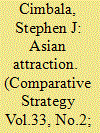

|
|
|
|
|
| Publication |
2014.
|
| Summary/Abstract |
The United States' military-strategic pivot toward Asia is motived by concerns about a rising China, about the increased significance of Asia on the world economic and political stages, and about the growing risks of nuclear proliferation and nuclear first use in that region. Nuclear Asia already numbers five acknowledged or de facto nuclear weapons states among its members: Russia, China, North Korea, India, and Pakistan. Failure to reverse North Korea's nuclear weapons status or political distrust among other powers may increase the number of Asian nuclear weapons states (including states with prospective nuclear-missile reach into Asia) to eight, creating an Asian-Middle Eastern nuclear arms race that defies containment. On the other hand, an alternative presents itself, in the form of a multilateral nuclear arms reduction agreement that would create three tiers of accepted nuclear weapons states and bar the door to new admits.
|
|
|
|
|
|
|
|
|
|
|
|
|
|
|
|
| 4 |
ID:
131389


|
|
|
|
|
| Publication |
2014.
|
| Summary/Abstract |
Under what conditions do regional security organizations (RSOs) take up a broader agenda or scope in security governance? Further, does broader scope matter for regional security? These questions are addressed using a quantitative comparative analysis of 25 RSOs over the period 1990-2009. Similarity among members in their capacities and political systems are identified as two central conditions for increased scope. In contrast, hegemony is not a significant factor. Institutionalization also seems to matter: RSOs that have been around longer and encompass more members are more successful in expanding their security agenda. There is only weak empirical support for the idea that RSOs with a broader scope have a stronger pacifying effect on regional security. The implications of these findings are discussed in greater detail for Asian RSOs, which have only limited scope and operate in comparatively high levels of insecurity. However, except from the legacy of conflict, variables identified in the general models apply similarly to Asia.
|
|
|
|
|
|
|
|
|
|
|
|
|
|
|
|
| 5 |
ID:
130244
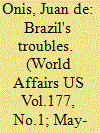

|
|
|
|
|
| Publication |
2014.
|
| Summary/Abstract |
With the extravaganza of the winter Olympic Games in Sochi over, the spotlight now turns to Brazil, the host of the FIFA World Cup championship in June. This tournament, the most widely viewed of global sports spectacles, is held every four years and involves thirty-two national teams, each of which has survived two years of regional competitions in Europe, Africa, Asia, and the Americas to reach the final play-offs. Starting on June 12th, sixty-four games will be played in four weeks, in stadiums all over Brazil, until the winner emerges in a final match on July 13th at the Maracanã, Rio de Janeiro's world-famous arena. Three million foreign fans are expected to visit Brazil, and billions of television viewers worldwide will watch the games. When the World Cup was awarded to Brazil in 2007-part of a remarkable parlay that included the award of the 2016 Summer Olympics to Rio as well-the country's economy was starting to boom as part of the BRIC upsurge that seemed ready to shake up international finance. The event was political from the onset, its significance potentially going well beyond the results on the playing fields where Brazil has won the world championship a record five times, a source of great national pride. But despite initial euphoria over being chosen to host the World Cup, Brazil is now experiencing doubts over whether it can pull off the event and second thoughts about the upsurge of influence on the international scene it was supposed to symbolize. The fervid devotion of Brazilians to soccer has made this country the Land of Football (as well as samba and Carnaval). Some non-Brazilian sports commentators have been baffled, therefore, by protest signs saying, "No to the Cup." But Brazil today is not just a land of football, it is also a land of public protests against corruption, heavy taxes, and deplorable public education and health services, cities with chaotic urban transport, markets with inflated consumer prices, and a dysfunctional political system that is manipulated by an elite for personal benefit.
|
|
|
|
|
|
|
|
|
|
|
|
|
|
|
|
| 6 |
ID:
132832
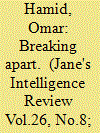

|
|
|
|
|
| Publication |
2014.
|
| Summary/Abstract |
Political and religious militants in Karachi used organized crime to fund their activities, protected by links to political parities and facing a weak security response. Omar Hamid examines the drivers behind the city's increasing fragmentation.
|
|
|
|
|
|
|
|
|
|
|
|
|
|
|
|
| 7 |
ID:
132533
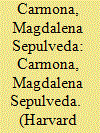

|
|
|
|
|
| Publication |
2014.
|
| Summary/Abstract |
The rapid manner in which social protection systems have gained prominence and political support in development and poverty reduction discourse over the past few years is practically without precedent, leading some to consider it "a quiet revolution." Latin American countries have been at the forefront of this "revolution," with political support for government-funded social protection mechanisms going hand in hand with a growing discourse in favor of a human rights approach in development agendas. This approach is in line with the constitutions of most Latin American countries (including Argentina, Bolivia, Ecuador, Colombia, Guatemala, and Brazil), which enshrine a long list of human rights and explicitly recognize that these norms impose limits on state power. This constitutional protection of rights includes not only civil and political rights, but a wide range of economic, social, and cultural rights (see e.g. the constitutions of Colombia, Brazil, and Costa Rica), the prohibition of discrimination (on the grounds of gender, age, ethnicity, disability, sexual orientation, health status, and others), and the obligation to take affirmative action to protect groups that have suffered from structural discrimination (see e.g. constitution of Ecuador).
|
|
|
|
|
|
|
|
|
|
|
|
|
|
|
|
| 8 |
ID:
134123
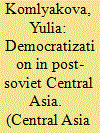

|
|
|
|
|
| Publication |
2014.
|
| Summary/Abstract |
The author analyzes how the Central Asian countries (Kazakhstan, Uzbekistan, and Kyrgyzstan) are moving toward democracy, as well as the political and geopolitical reasons behind the United States' interest in the region triggered by the Soviet Union's disintegration and Washington's desire to consolidate its position in the post-Soviet space. It was determined to realize its interests by planting democratic values in the newly independent states and urging them to orientate themselves toward democratic principles when shaping their policies. In this way, the Central Asian countries could count on Washington's political support and economic aid.
In an effort to enter the world scene as democratic states, the Central Asian countries built state structures that relied on constitutions describing them as democratic states; they created a party and election system and passed laws on the freedom of speech, glasnost, etc. This, however, has not transformed the post-Soviet Central Asian republics into paragons of democracy: the clan system is very much alive in the corridors of power; Soviet mentality remains predominant among state officials (practically all the top figures preserved their posts in the newly independent states); and the influence of Russia and the authoritarian traditions inherited from the past is still very obvious.
|
|
|
|
|
|
|
|
|
|
|
|
|
|
|
|
| 9 |
ID:
133047
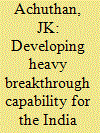

|
|
|
|
|
| Publication |
2014.
|
| Summary/Abstract |
A 'heavy breakthrough capability' in India's context relates to having the capability to reach objectives up to 100km in depth, should the political circumstances impose war on our nation.
Our democratic set up will never allow India to become the aggressor, as the people's support will never be available for even thinking at such dangerous and unproductive ventures. India
does not believe in either territorial conquest or torcible amalgamation ot unwilling or a dillerent
type of population. Such actions can only be carried out by totalitarian regimes which can easily misrepresent tacts to their countrymen and live a lie while festering rebellions gather smoke waiting tor the central authority's power to wane. It was exactly such a situation that arose in the erstwhile Soviet Union leading to its break up.
|
|
|
|
|
|
|
|
|
|
|
|
|
|
|
|
| 10 |
ID:
132498
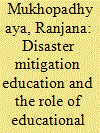

|
|
|
|
|
| Publication |
2014.
|
| Summary/Abstract |
Disasters are increasing exponentially. The number of disaster events which was 73 in 1900-09 has increased to 4494 during 2000-09. More people were affected in the two recent decades than the earlier ones. During the second half of the 20th century, more than 200 major natural disasters occurred in different parts of the world and claimed the lives of around 1.4 million people. In 2011 alone, 302 hazards resulted in disasters that claimed almost 30,000 lives, affected 206 million people and in?icted damages worth an estimated USS 366 billion, according to the United Nations Office for Disaster Risk Reduction.
|
|
|
|
|
|
|
|
|
|
|
|
|
|
|
|
| 11 |
ID:
131060


|
|
|
|
|
| Publication |
2014.
|
| Summary/Abstract |
The political economy of trade literature argues that compensating those who lose from trade is an important component of maintaining public support for free trade, a linkage known as the compensation hypothesis or embedded liberalism thesis. Previous research has found support for many elements of the causal chain underlying embedded liberalism; however, there has been little research on the most crucial element of the causal chain, namely that compensation policies lead to increased support for trade. This article provides a direct test of the compensation hypothesis using a survey-based experiment conducted in the United States that exposes half of the respondents to knowledge of compensation programs and then asks for their opinion on trade policy. The article explores whether knowledge of compensation increases support for trade as well as who is influenced by this knowledge and, thus, provides a crucial test of the embedded liberalism thesis.
|
|
|
|
|
|
|
|
|
|
|
|
|
|
|
|
| 12 |
ID:
167849
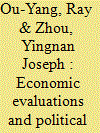

|
|
|
|
|
| Summary/Abstract |
The economic voting literature argues that economics matters to democratic leaders. We argue that it matters to authoritarian leaders, too, and its influence is stronger there than it is in democratic countries. Using data on four Asian countries from the Asian Barometer Survey, we find substantial support for our theory.
|
|
|
|
|
|
|
|
|
|
|
|
|
|
|
|
| 13 |
ID:
132580


|
|
|
|
|
| Publication |
2014.
|
| Summary/Abstract |
The Intergovernmental Panel on Climate Change (IPCC) Fifth Assessment Scienti?c Report, published on March 31, 2014, once again reemphasised that climate change is real, caused by humans, and it continues unabated.' If humanity does not choose to reduce global carbon emissions and live in harmony with nature, global warming will continue and the Earth will see far more dangerous and potentially irreversible impacts in the decades ahead. There has never been a greater urgency to act than there is now.
|
|
|
|
|
|
|
|
|
|
|
|
|
|
|
|
| 14 |
ID:
095015


|
|
|
|
|
| Publication |
2010.
|
| Summary/Abstract |
Corruption is important because it undermines bureaucratic predictability and is a potential threat to support for a political regime. The perception of corruption is the most commonly used measure of the actual incidence of corruption. This article marshals the New Russia Barometer survey data to challenge this assumption. Even though most Russians perceive a variety of everyday public services as corrupt, this assessment is not based on first-hand experience. Only a minority pays bribes. We test four hypotheses about differences in individual perception and experience of paying bribes: the ability to pay, contact with public services, normative acceptability and political awareness. Contact is most important for paying bribes whereas political awareness is most important for the perception of corruption. We also test how much the perception and experience of corruption, as against other forms of political and economic performance, affect support for the regime. Support is driven by the substantive performance of government, especially its management of the economy, rather than by the perception or experience of corruption.
|
|
|
|
|
|
|
|
|
|
|
|
|
|
|
|
| 15 |
ID:
133713
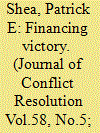

|
|
|
|
|
| Publication |
2014.
|
| Summary/Abstract |
With access to inexpensive credit, states can finance wars without overburdening their constituents, and face relatively small short-term costs compared to states with poor credit access. As a result of these economic benefits, states with lower credit costs will be more likely to win their wars, ceteris paribus. However, lower borrowing costs provide states domestic political benefits, which I argue are more important for democracies than nondemocracies. Since expensive credit forces states to rely on its citizens for revenue, governments that are more sensitive to their citizens' preferences are at a disadvantage. In sum, I argue that democracies are more sensitive to credit costs than authoritarian regimes. To test this theory, this article analyzes a data set of wars using logistic regressions and matching techniques, and examines the case of the Chaco War. The results demonstrate that the costs of borrowing have a substantial effect on war outcomes, and that these costs are more important for democracies than nondemocracies.
|
|
|
|
|
|
|
|
|
|
|
|
|
|
|
|
| 16 |
ID:
131996
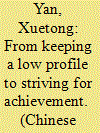

|
|
|
|
|
| Publication |
2014.
|
| Summary/Abstract |
Since 2012, some scholars, both Chinese and foreign, have argued that China's assertive foreign policy is doomed to fail. Nevertheless, after examining China's foreign relations in the last two years, this paper finds that China has experienced improved relations rather than deteriorating ones. In comparison with the strategy of keeping a low profile (KLP), the strategy of striving for achievement (SFA) shows more efficiency in shaping a favorable environment for China's national rejuvenation. The author applies the theory of moral realism to explaining the role of the SFA strategy and argues that morality can increase both international political strength and the political legitimacy of a rising power. The key difference between the KLP and the SFA is that the former focuses on economic gains and the latter seeks to strengthen political support. That is the reason that the SFA values the role of morality and the KLP does not. Due to these different goals, the SFA strategy differs from the KLP strategy in aspects of tenets, general layouts, working approaches, and methods. So far, the SFA has achieved progress beyond people's expectation from Xi Jinping in 2012. Xi's strong leadership may become a new case suitable for illustrating the theory of moral realism.
|
|
|
|
|
|
|
|
|
|
|
|
|
|
|
|
| 17 |
ID:
133175


|
|
|
|
|
| Publication |
2014.
|
| Summary/Abstract |
General dynamics Canada has teamed with Ultra Electronics Maritime Systems and Raytheon Canada to bid to upgrade the anti-submarine warfare (ASW) sonar suite on the Royal Canadian Navy's (RCN) 12 Halifax Class Frigates.
|
|
|
|
|
|
|
|
|
|
|
|
|
|
|
|
| 18 |
ID:
132544
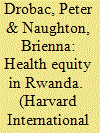

|
|
|
|
|
| Publication |
2014.
|
| Summary/Abstract |
This April, Rwanda will commemorate the 20th anniversary of one of the last century's greatest human tragedies, the 1994 genocide that took the lives of one million Tutsis and moderate Hutus in just one hundred days. As the global community turns its attention to Rwanda on this occasion, they will find a country radically different from the Rwanda of the past. The new Rwanda is a stable and increasingly prosperous country, one where life expectancy has doubled since the difficult aftermath of the genocide. The government's commitment to equity has catalyzed rapid and widespread development, largely by creating opportunity for its poorest citizens. Meanwhile, the health sector's pioneering efforts in health care delivery have drawn global attention. With strong leadership, smart partnerships and innovative programs, Rwanda is forging a new pathway for development.
|
|
|
|
|
|
|
|
|
|
|
|
|
|
|
|
| 19 |
ID:
132500
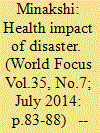

|
|
|
|
|
| Publication |
2014.
|
| Summary/Abstract |
Gender and Health Issues in Disaster: Disasters are traumatic events that are experienced by many
people and may result in a wide range of mental and physical health consequences (Norris, Friedman,
Watson, et al., 2002). The resulting impacts from disasters are frequently more severe on women and
girls than those of their male counterparts and women's physical, reproductive and mental health needs, along with other facets of women's lives,.have largely been ignored in the whole process (Laska et al., 2008). According to WHO, there is pattern of gender differentiation at all level of disaster process: exposure ' to risk, risk perception, preparedness, response, physical impact, psychological impact, recovery and reconstruction and there is evidence showing that women and men may sufferdifferent negative health consequences after the disaster (WHO, 2002). However, it is not clear whether this is due to biological differences between the sexes, because of socially determined differences in women's and men's roles and status or because of the interaction of social and biological factors (WHO, 2002).
|
|
|
|
|
|
|
|
|
|
|
|
|
|
|
|
| 20 |
ID:
133171
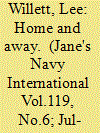

|
|
|
|
|
| Publication |
2014.
|
| Summary/Abstract |
Dr. Lee Willett looks at the UK's new maritime security strategy and the RN's role I supporting UK interest overseas and home
|
|
|
|
|
|
|
|
|
|
|
|
|
|
|
|
|
|
|
|
|